Key takeaways:
- Daily clean-ups significantly improve mental well-being and productivity, creating a more inviting and focused environment.
- Establishing a structured routine, including specific zones and short time limits, makes cleaning less overwhelming and more efficient.
- Regular evaluation and adjustment of cleaning habits enhance effectiveness and help maintain a sense of organization and calm in daily life.
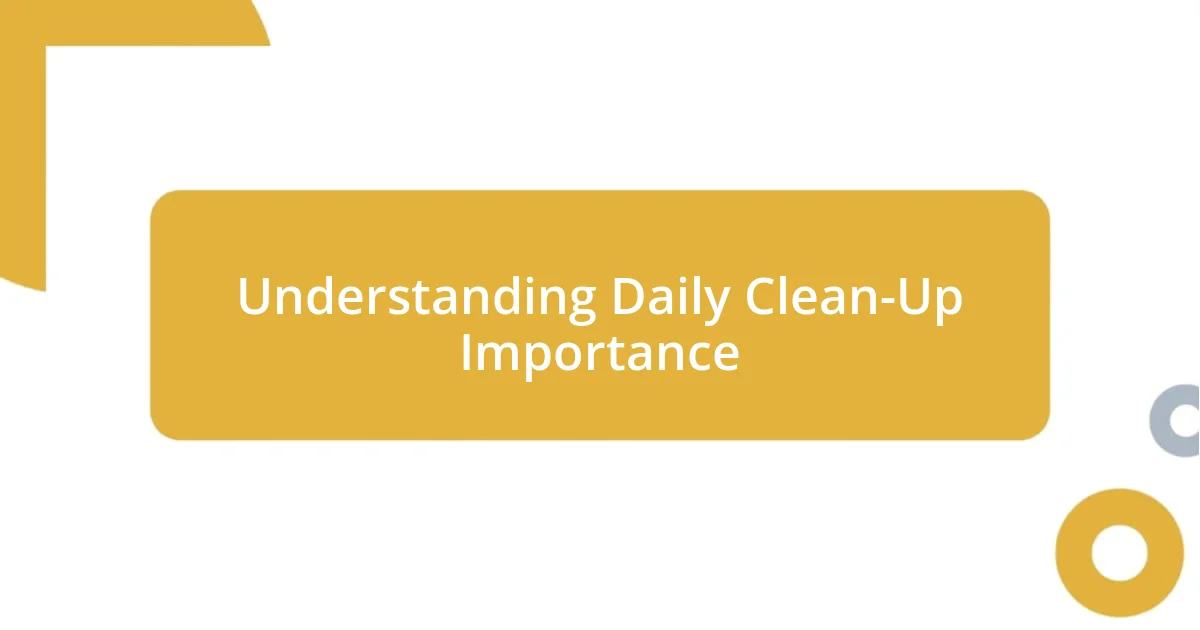
Understanding Daily Clean-Up Importance
Understanding the importance of daily clean-ups can profoundly impact our mental well-being. I remember a particularly chaotic week in my life when I neglected tidying up—my usually inviting space felt more like an overwhelming obstacle course. Doesn’t a clean environment make you feel lighter and more focused?
When clutter builds up, it’s not just a physical space that gets affected; our minds can feel just as cluttered. Picture this: you’re about to settle down with a good book, but every corner of your home reminds you of unfinished tasks. Isn’t it hard to relax like that? I’ve found that spending just a few minutes to declutter each day transforms my evenings into a sanctuary of calm instead of a source of anxiety.
Moreover, daily clean-ups create a ripple effect of productivity. I’ve experienced days where the simple act of putting away my shoes and tidying up the kitchen led to tackling other tasks on my to-do list. Have you experienced that same burst of motivation after a quick clean? It’s fascinating how a small effort can lead to big results, don’t you think?
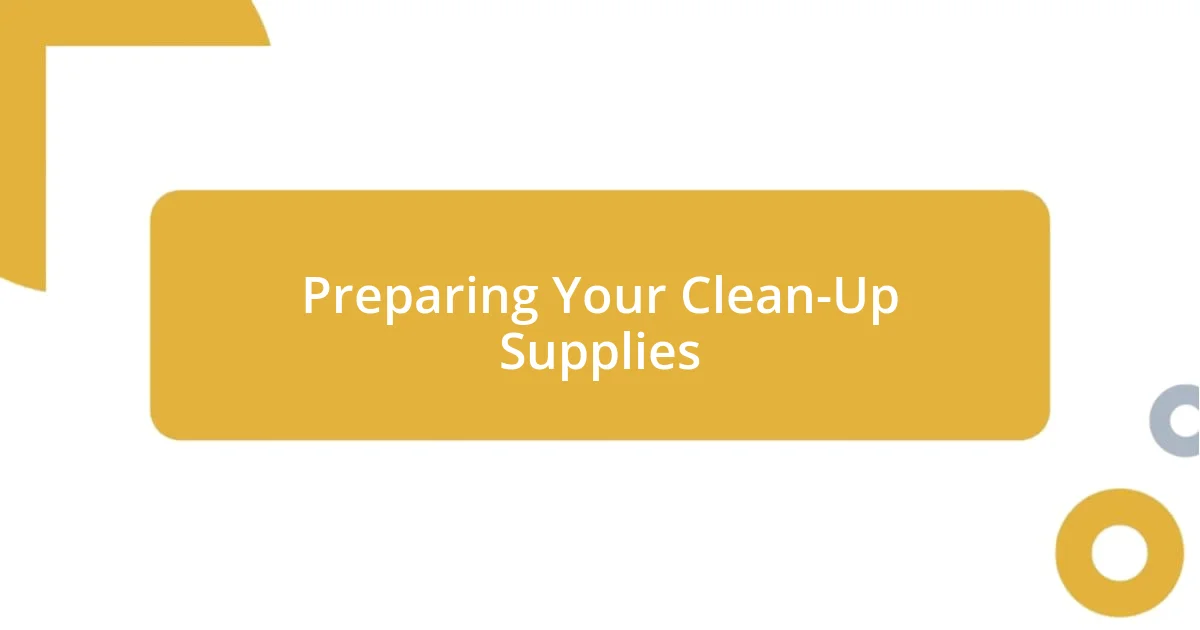
Preparing Your Clean-Up Supplies
Preparing your clean-up supplies is essential to streamline your process and make daily tidying less daunting. I’ve found that having a dedicated spot for everything—from all-purpose cleaners to microfiber cloths—saves precious minutes during my routine. When I can easily grab what I need, I feel more motivated to start cleaning, and the whole process becomes less of a chore.
One day, I noticed I was struggling to find my cleaning supplies in a cupboard stuffed with various items. Frustrated, I spent an entire afternoon organizing and labeling everything. The difference was amazing! Now, my supplies are neatly arranged so I can quickly access them whenever I feel the urge to tidy up. It’s become a simple routine that sets a positive tone for my cleaning sessions, making me more efficient and even a little proud of my organized space.
To maximize efficiency, prepare a checklist of essential supplies tailored to your cleaning needs. This way, you can ensure you have everything at hand before you start. I often refer to my list before heading out to shop for supplies, and it helps prevent impulse buys of items that I really don’t need. Trust me—the gratitude I feel when facing a clean room without the stress of clutter makes all the preparation worth it.
| Essential Supply | Purpose |
|---|---|
| All-Purpose Cleaner | For various surfaces |
| Microfiber Cloths | Dusting and wiping |
| Trash Bags | For quick decluttering |
| Broom and Dustpan | For quick clean-ups |
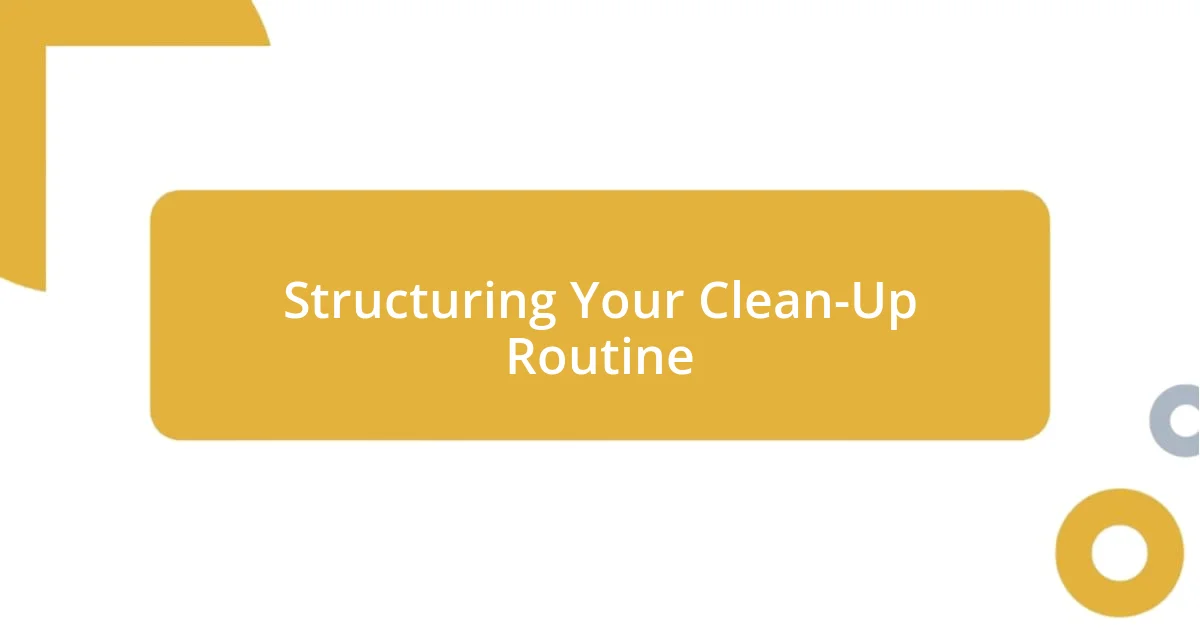
Structuring Your Clean-Up Routine
Structuring your clean-up routine is all about simplicity and consistency. I’ve found that breaking tasks into smaller, manageable chunks helps to keep me focused. On days when my energy feels low, I tackle just one area, like the kitchen counter or my desk, making the task feel less overwhelming and more achievable.
To make the most of your clean-up time, consider implementing a structure that resonates with your lifestyle. Here are some key points that have worked for me:
- Set a timer: I often set a 10- or 15-minute timer, which creates a sense of urgency and makes it feel like a game.
- Choose specific zones: Focus on one zone at a time—say, my entryway or living room—ensuring you give it your full attention.
- Prioritize: I prioritize areas that irritate me the most; it’s incredible how tackling a messy corner can change my mindset for the day.
- Establish a routine time: Whether it’s right after breakfast or before bedtime, a consistent time helps me form a habit.
- Involve family: I invite my kids to join in, turning clean-up time into a fun family activity. Trust me, the laughter makes the chore feel lighter!
By structuring my clean-up routine this way, I’ve noticed that not only is my space more inviting, but my mental clarity also improves tremendously. This little ritual has become a refreshing break in my day rather than another task to dread.

Tackling High-Traffic Areas First
Tackling high-traffic areas first has been a game changer in my daily cleaning routine. I’ve noticed that spaces like the living room and kitchen see the most activity; when they’re clean, it instantly uplifts the atmosphere. Just the other day, I walked into my living room after a hurried morning—like a breath of fresh air, everything felt lighter once I cleared the clutter from the coffee table.
I often remind myself that first impressions matter, even in our own homes. When I see friends or family walking through my front door, I want them to feel welcomed, not overwhelmed. That’s why I make it a habit to start with the entryway—believe me, a little tidying there already sets a positive tone for the entire house. Can you imagine how a quick sweep or dusting can transform the feel of a busy space before the day even starts?
By focusing on these bustling areas first, I gain energy and motivation to continue. There’s a certain satisfaction in watching grime and disorder disappear, and it’s like a little reward for my efforts! Have you ever experienced that rush when a once-chaotic room suddenly looks inviting? I treasure those moments as they boost my mood and encourage me to tackle other spots with the same vigor.
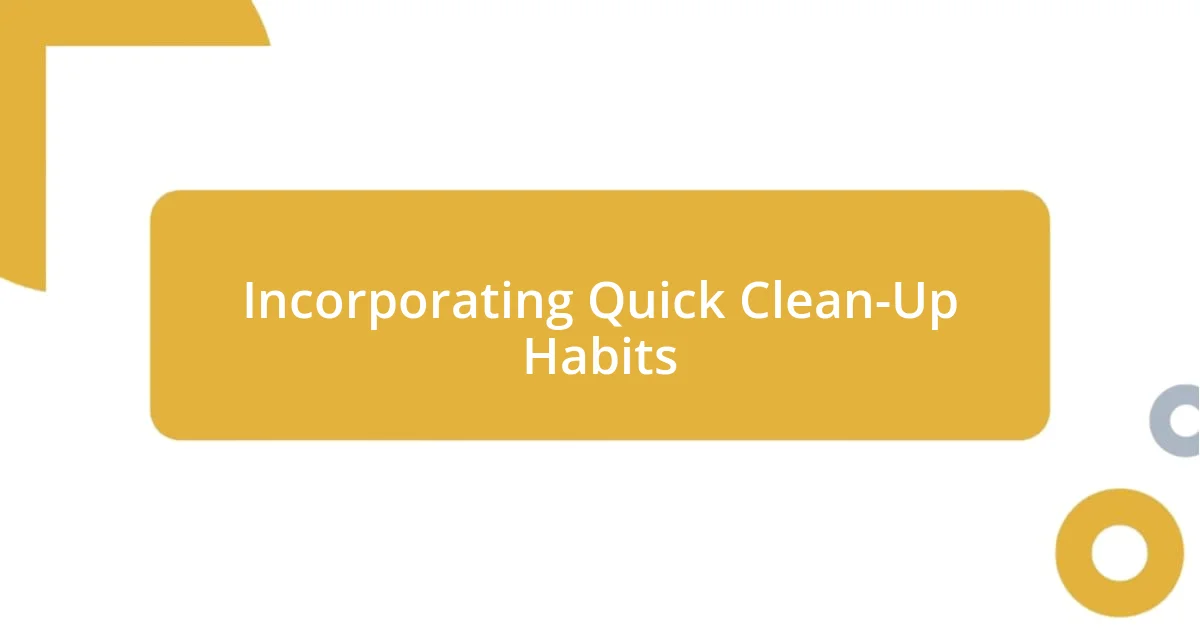
Incorporating Quick Clean-Up Habits
Incorporating quick clean-up habits into my daily routine has made a noticeable difference in how I view chores. One small change I’ve made is utilizing the “one-minute rule.” This means if a task takes a minute or less—like putting away shoes or wiping down a countertop—I do it immediately. It’s amazing how these little actions accumulate, transforming clutter into a tidy space without feeling like I’ve dedicated hours to cleaning. Have you ever noticed how refreshing it feels when everything’s in its place? That instant gratification keeps me motivated.
Another habit I’ve adopted is creating clean-up triggers throughout my day. For instance, I link cleaning up to routine activities like making coffee or brushing my teeth. As I stand waiting for my coffee to brew, I’ll quickly tidy the sink area or wipe down the stove. This approach not only saves time but also turns mundane moments into productive ones. I can’t help but smile when I realize that my day starts off in a cozy, uncluttered kitchen instead of a chaotic jumble. Isn’t it reassuring to know that small adjustments can lead to significant changes in how we feel about our home environment?
Finally, I believe in the power of visual reminders to stay on track with my clean-up habits. I’ve placed sticky notes on the fridge or bathroom mirror, highlighting tasks I want to prioritize. One time, I wrote “A clean home is a happy home,” and it genuinely inspired me every time I brushed my teeth. Mindset plays such a crucial role, doesn’t it? Seeing that note reminds me that each little effort contributes to a happier, calmer space. What strategies or reminders could you implement to help you stick to your own cleaning habits?
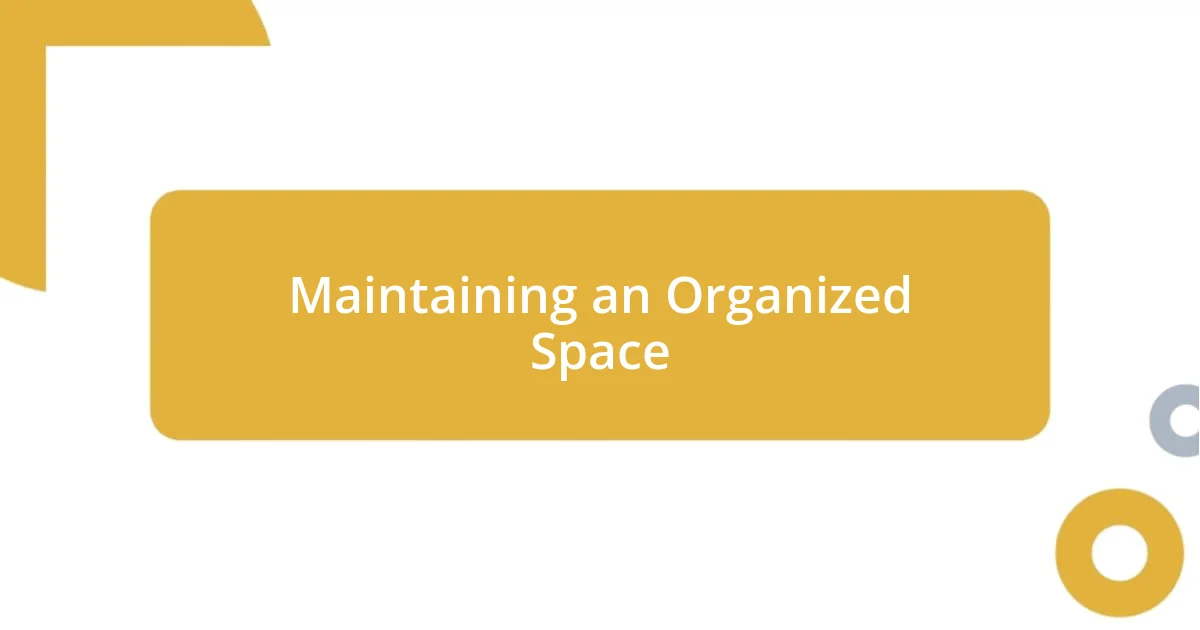
Maintaining an Organized Space
Maintaining an organized space is truly a mindset shift for me. I’ve realized that clutter not only affects my environment but also my mental clarity. One evening, after a long day, I sat down in my room, surrounded by scattered books and clothes, and felt overwhelmed. Organizing those spaces became a therapeutic practice; now, I make it a point to spend just a few minutes each night decluttering. Doesn’t it feel different waking up to a calm, organized room instead of chaos?
A practical tip that I’ve found invaluable is the “everything has a place” principle. I used to leave items strewn about, convinced I’d remember where everything was. But that approach only led to frustration and wasted time. Creating designated spots for items—like my keys on a hook by the door—has been a game changer. Recently, I’ve even color-coded some of my storage bins for easy identification. It’s surprisingly satisfying to see everything in order. Have you thought about how much easier life is when you know exactly where to find things?
Additionally, I’ve discovered that as I tidy up, I also gain a deeper appreciation for my belongings. When I sort through old clothes or unused items, I often feel a sense of nostalgia or relief in letting go. The process of decluttering has become almost meditative for me. I ask myself, “Does this item bring me joy?” Embracing this philosophy encourages an ongoing awareness of what I truly need around me. How might letting go of unnecessary items create more space—not just physically, but emotionally as well?

Evaluating and Adjusting Your Routine
Evaluating your clean-up routine regularly is essential for maintaining its effectiveness. I’ve found that taking a few minutes at the end of each week to assess what worked and what didn’t provides invaluable insights. For instance, I used to allocate too much time to certain areas while neglecting others, and it left me feeling frustrated. Have you ever realized that focusing on a specific space, like your entryway, can make a huge difference in how welcoming your home feels?
Sometimes, tweaking just one element can lead to a more seamless routine. I once noticed that my kitchen clean-up felt overwhelming because I wasn’t cleaning as I cooked. So, I decided to load the dishwasher during meal prep. That slight adjustment turned a chaotic post-dinner clean-up into a breeze. Does it surprise you how small tweaks can lead to major time savings?
As I continued refining my approach, I learned the importance of listening to my intuition. If certain clean-up triggers don’t resonate with me, I ditch them. Experimenting with various techniques has led me to find what genuinely fits my lifestyle. Trusting my instincts has turned cleaning from a chore into a manageable part of my day. How have your own routines transformed by allowing yourself to adjust and adapt over time?















